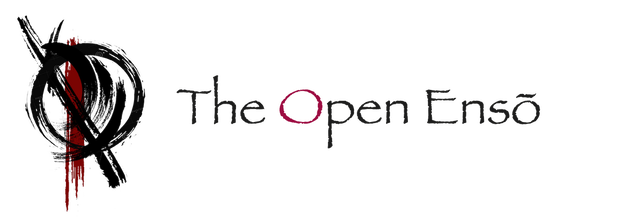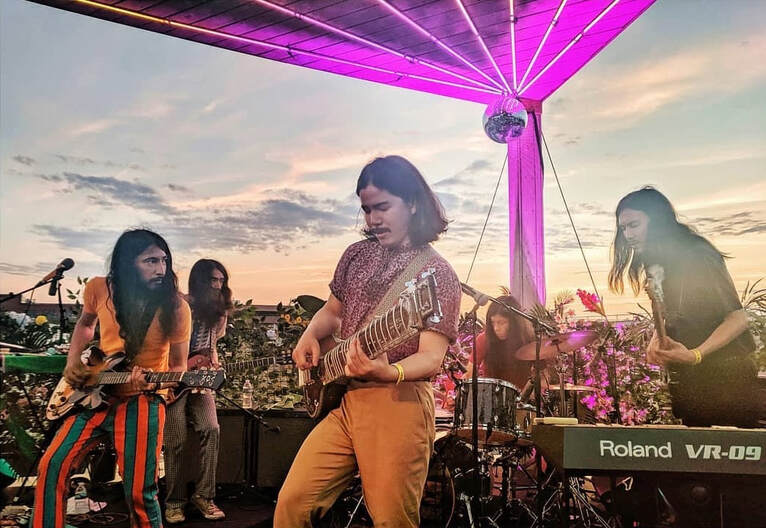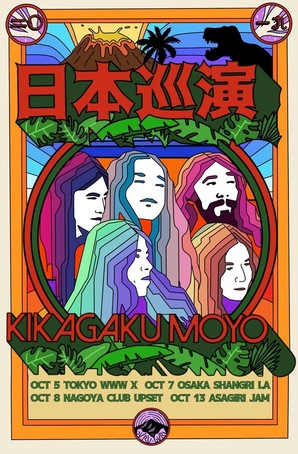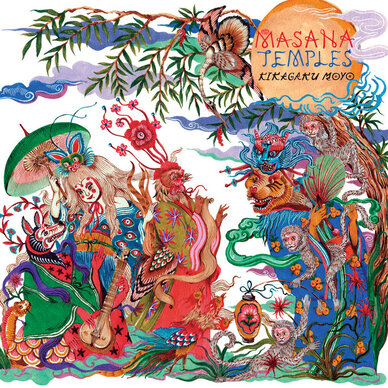Menu
|
Yesterday evening in Oslo, tonight in Bern, tomorrow afternoon playing at a festival on an alp in the Valais: Kikagaku Moyo don’t take it easy to bring their music to the people. "Last night we did not sleep at all," Go Kurosawa tells me before the concert at ISC in Bern, Switzerland. “We finished the concert in Oslo at 2am, at 4am we were back at the hotel and two hours later we had to leave for the airport.” "What do you do to ease the stress when touring? Working out?,” I ask Go. "No, I'm the drummer”, he replies, "that's already pretty physical. I relax when I play on stage. And when I'm really tired I tell myself that I’m extremely lucky to be able to do what I love to do." Kikagaku Moyo have been around since 2012 when the band started out busking on the streets of Tokyo. Their last and best album so far, "Masana Temples", is from 2018, recorded and produced in Portugal. Besides Go, the band consists of his brother Ryu on sitar, Tomo Katsurada on guitar and all sorts of percussion instruments, Daoud Popal on guitar and Kotsu Guy on bass. Kikagaku Moyo play psychedelic music: they like to improvise and take their time for long songs. Psychedelic music dates back to a time in the 1960s when artists believed that drugs would make their music sound better. Psychedelic drugs such as LSD led to an increased consciousness among consumers, which then had an effect on the music that was composed and played under the influence of these drugs. On the other hand, this music also had the effect of deepening and expanding the experience of the drugs. It was the classic example of a mutual leverage that was not always understood by outsiders. "Can you play psychedelic music without drugs?”, I ask Go. "I think so”, he replies. "In the past I also took drugs, but not anymore. It's about experimenting with your consciousness. You can achieve the desired state without drugs. Sure, the drugs have played an important role in the history of psychedelic music, but reducing everything to drugs would be too much of a shortcut. Psychedelic is like a philosophy: it's also about the social movements of the 1960s and 1970s, it's about literature and also about fashion.” (Kikagaku Moyo are indeed a band with style and undoubtedly look good. GQ recently hyped them as “they might be the best-dressed band of the decade.") "Everything is just music and there is no ‘me’ anymore.” The desired mental state, however, can not be reached through two-minute songs. The true trip only begins when the music draws longer. Kikagaku Moyo then try to focus five individuals on one thing, to create something unique under this burning glass. This is a kind of collective meditation and as if in a trance the band shoves forward with their music. "For me as a drummer, this condition is relatively easy to achieve," says Go. "I'm sitting in the back of the stage, in the dark, and can plunge into my own zone, away from the audience. I stop thinking and my arms and hands work automatically. Everything is just music and there is no ‘me’ anymore.” Right from the start of the concert the audience falls into an "instant trance". A repetitive bass line, strumming guitars, Go who sits at the drums and sings: The tense drowsiness of the band goes well with the sleepwalking spirituality of their music. A few minutes into the first song the heads of the listeners already bob dangerously. Kikagaku Moyo are constantly looking for a unification in sound until a groovy bassline sets in and leads the band out of their self-imposed impasse. For some songs the drums are left aside. Tomo has all sorts of sound gadgets in his repertoire - triangle, gongs, cowbells - and Go tries his hand at the flute. These are special effects almost like in filmmaking. My imagination goes into overdrive as well with Kikagaku Moyo’s brand of music. And this not only in a concert setting but already when I listen to their album. Let’s take "Dripping Sun”, the second song from the Masana Temples album. It starts out as a Sergio-Leone spaghetti western and then quickly merges into a 1970s cop movie (it could also be something by Quentin Tarantino, "Jackie Brown" maybe). Later I see a car chase (or even a helicopter overflight?), just before the songs fades quietly back into suburban Japan, to people who wait for the bus while enjoying the sun (if they had the leisure to do so). The city pop of Tatsuro Yamashita trickles down their ears through their Sony walkmen. However the situation is more serious than one thinks. The guitars are racing in California and the last dolphins are dancing far out in the sea. At the end of “Dripping Sun” we are back in the police film which is slowly heading towards a showdown. The hero thinks back to Japan one last time. Then the sun goes down for him as well. For once in Bern, Guillaume Hoarau, the star striker of the local football club, is not the favorite player of the masses. Tonight it's Daoud Popal, Kikagaku Moyo’s guitarist. His fuzz guitar keeps cutting deep furrows in the feel-good-field of non-violent music that his colleagues till with a smile. He is assisted by Ryu Kurosawa's sitar. "The sitar is really a special instrument, it could almost replace an entire band," says Go Kurosawa. "There used to be quite a few bands with sitars. But we want the sitar not to sound like Indian kitsch, but modern. That's why we use the sitar like a guitar, with amplifiers and effect pedals. I assume that Greta Thunberg listens to a lot of psychedelic music. If not, she should start to do so, to give her message even more depth. Mindfulness - towards fellow human beings, towards nature, towards oneself - is contemporary. In this sense, psychedelic music is also contemporary. The message of Kikagaku Moyo may be more necessary today than it was then, when this music had its big bang. It goes beyond a mere "Peace and Love". It means, in the truest sense of the Greek origin of psychedelic, to let the soul manifest itself and to develop the potential of the human mind further. Then we will be able to again give little things the appreciation they deserve. This may seem like little. But we have to start somewhere.
0 Comments
Leave a Reply. |
EditorKurt is based in Bern and Beirut is his second home. Always looking for that special angle, he digs deep into people, their stories and creations, with a sweet spot for music. Archives
September 2020
Categories
All
I'd love to discover you. Share your creations here.
|




 RSS Feed
RSS Feed
